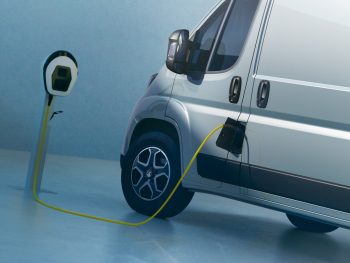The Government has said it recognises the challenges for van decarbonisation and provided assurances that further solutions are under development to support fleets.

Speaking at the BVRLA’s recent Fleets in Charge webinar, Lizzie Culwick, joint head of the Office for Zero Emission Vehicles (OZEV), pledged support for the sector and discussed the van-specific measures currently on offer.
While thousands of van drivers have already made the switch to electric, many fleets are reporting barriers in the form of high costs, poor product, and inaccessible infrastructure.
The zero emission vehicle mandate launching 1 January 2024 is expected to help drive take-up by ensuring more electric vans are brought to market. The mandate requires at least 10% of new van sales in 2024 to be on qualifying zero-emission models, with the proportion incr
During the webinar, Culwick took delegates through the mandate and how it targets a gradual acceleration of electric van fleets.
But she also outlined current government support relating to charging infrastructure and eLCV financial incentives.
This includes the Plug-in Van Grant (PiVG). While the Plug-in Car Grant was closed in June 2022, the van grant, first launched in 2012, was extended in March 2022 and is available until 2024/25, although support beyond then hasn’t been confirmed.
For small vans (up to 2.5 tonnes GVW), it offers a maximum of £2,500, cut from the previous £3,000 level in December 2021, while for large vans (2-3.5 tonnes GVW) the funding stands at £5,000, compared to the £8,000 before. These grants are available on eligible vehicles and with the discount included by the seller in the purchase price.
Earlier this year, OZEV increased the limit on PiVG orders from the previous level of 1,000 PiVG orders per end customer, per financial year, to 1,500.
During the BVRLA webinar, Lizzie Culwick also told delegates of government work to improve the charging experience and accessibility, including the new charge point rules, as well as the broader provision of fleet-friendly charging infrastructure.
Lizzie Culwick said: “Decarbonisation of vans is really crucial to our efforts to decarbonise our road transport system and reach net zero by 2050. In 2021, vans alone accounted for about 16% of the UK’s domestic transport emissions. That’s a huge opportunity for vans to become the road to zero hero, but we also need to recognise that van decarbonisation faces a particular set of challenges.”
The webinar also included a panel discussion and saw a unanimous call for a new plan for vans in 2024.
Fleet experts, including representatives from Allstar, EV Essentials, Mitie, and ProGreen, explored the practicalities of the transition and what it means for operators today. They established that, while progress towards zero-emission vans continues, its “exceptional potential is yet to be unlocked through support being deployed in the right areas”.
Michelle Miles, head of ProGreen, said: “We need to be practical. We need to be open-minded. We need to collaborate and not set ourselves up for failure. The biggest thing? We need to be brave, because out of all our customers to have made the transition, not one has looked back.”
Toby Poston, BVRLA director of corporate affairs, added: “Vans need targeted support. This is a topic on which the BVRLA has been a firm and consistent flagbearer. We led the way with our Van Plan in 2021 and will be publishing an all-new plan in 2024. That sees us collaborating with other trade associations, CV experts and decarbonisation leaders, creating a fully rounded, actionable plan.”
Earlier this year, the BVRLA warned that van fleets are struggling to make the zero-emission transition and the previous 2030 phase-out target for petrol/diesel vans was “at serious risk”.
While the ICE ban has now been moved back to 2035, issues with finding fleet-friendly public charging infrastructure and electric vehicles that can match diesel counterparts on cost of ownership, payload or range continue to hamper the EV switch.
The ‘Vans: Becoming the road to zero hero’ webinar is free to access via the BVRLA website now.
More details of the BVRLA’s 2024 campaign and launch of the Van Plan are due shortly.

